- Home
- Sahara Kelly
Oh My Laird!: A Risqué Regency Romance
Oh My Laird!: A Risqué Regency Romance Read online
Oh, My Laird!
Sahara Kelly
Copyright 2016 Sahara Kelly
Cover Art Copyright 2016
Sahara Kelly, P and N Graphics, LLC
Acknowledgements
To anyone who reads a book – thank you. To those of you reading a Regency for the first time – even more thanks for taking a gamble on a new genre. To those of you who have read my other Regencies—well I’m out of words, because you are the most amazingly wonderful and loyal readers, and I’d hug you all if I could.
I’m so glad you share my love for this era; whether it’s the clothes or the social environment or just the adventure of a different time. Thanks for coming back yet again to have some laughs, some passion and some wild times with me in the Regency. I hope you enjoy this one as much as those you’ve read before.
A special hug to my Florida family. Most of this book was written on your kitchen table, while looking out over heat-heavy fields, horses, cows, sand cranes, a gecko or two, and a single steer. Also thank you for your very efficient air conditioning without which both I and my laptop would have melted, and this story would never have been written.
Author’s Note
Some portions of this story are set in Northern England and Scotland – the border areas. I will ask forgiveness in advance for any errors in describing the landscape – I was there once as a child, and don’t recall very much at all. Plus there is always the consideration of what it would have been like in the early 1800’s. So pardon my shortcomings, and bear with me while I exercise a bit of literary license in creating a landscape best suited to my story.
When it comes to rubies, however, the task of describing the one featured in this tale is much easier, thanks to many great sites devoted to that particular jewel. I have a beloved pair of ruby earrings, and it’s easy to understand why this stone is so popular. Learning about “cooked” versus natural rubies, preferred cuts and the variety of sizes…well, one of the lovely benefits of being a writer is the astounding amount of information one picks up, just from researching a single topic!
[A note about dialects. Ian McPherson is Scottish, born and raised. But he has spent several years in London as a Bow Street Runner. Sometimes the accent helps, but at others it proved hazardous—robbing Ian of the “anonymity” encouraged by Bow Street. He didn’t want to be known as the “Scottish Runner”. So he shed it, working hard to eliminate all traces as often as possible. At times, of course, it does return. I took for my models some well-known actors of today, who are one hundred percent Scottish, but you’d never know it from their on-screen performances. Check out Torchwood, Arrow, and a couple of the Doctors Who for examples!]
Prologue
“Owwww—wot th’ ‘ell…le’go me ear…”
The urchin squawked as a large hand grabbed his appendage in a firm grip just as he was about to surreptitiously lift a pie from the baker’s cart in the busy marketplace. He glanced up. “Cor blimey, it’s the Runner.”
“What did I tell you last time, Timmy?”
The lad hung his head as best he could, given that there was still a tight tug on his ear. “I ain’t supposed ter nick nuffin’.”
There was silence for a moment. “Where’s your Da?”
“Gone orf. Ain’t seen ‘im fer close on a week now.”
The Runner sighed, and released the boy, beckoning to the baker and adding two more pies to Timmy’s swag. Coins changed hands.
“Take these home to your Ma and share them with the others, all right?”
The urchin’s eyes widened. “All fer us?”
“All for you. And here.” He reached into a pocket and withdrew a small square card. “There’s a lady at this address who might be able to find some odd jobs for you, so you can earn pie money. Give it to your Ma and have her go with you.”
Timmy stared at the card, but took it and dutifully put it inside his grubby vest. “I’ll be good, Mr. Runner. I promises yer. And thank yer fer the pies.” He took off as fast as his little legs would carry him.
“That’s Mr. McPherson, lad…” He called after the retreating figure, but doubted he’d been heard. He sighed. There were too many Timmys in London, hungry urchins who might, if they survived, grow up to become the next generation of criminals. He liked to think that this particular Timmy wouldn’t be one of them.
Ian McPherson was indeed a Bow Street Runner, but he had a preference for crimes which required a bit of thought in the solving. He had a mind and liked to use it, so he’d cultivated some strange acquaintances over his five years carrying the Runner’s Baton. They had come in handy now and again, and he was in this part of London to see if they would repeat that usefulness.
He walked on toward the large warehouse where his quarry had an office. Mr. Cheeky Winters—he of the Raphael-like cherubic cheeks—was the de facto ruler of this particular slum. Nothing took place within these alleys that Cheeky didn’t either approve or know about.
His direct interests and financial resources circulated around opium dens and brothels, which paid for the nice house Ian knew he owned on the outskirts of London, far away from this stew.
But since Cheeky knew more than almost any other denizen of these parts, Ian was on his way to see if by chance he’d heard anything of a gem—a ruby—big as a pigeon’s egg. Or so he’d been told. Some nimble-fingered villain had ripped it from the neck of a society beauty and she wanted it back.
Not that Ian could blame her. It was just that his opinion of society beauties, and the Ton in general, wasn’t particularly high. This one had probably run to her Papa, sobbed, whined, and instead of making do with another piece from her huge collection of jewelry, demanded a someone be fetched that very instant to retrieve her precious ruby.
Typical.
He frowned as he walked, recalling that because of this damned jewel he’d had to miss the marriage festivities of one Delaney Deverell. He was not happy about that, since he’d also missed out on seeing Lucius Gordon and Charles Fontaine, or Lord Penvale as he was now known.
It would have been one hell of a party, and missing it did not make him look any more favorably upon a spoiled and over-indulged woman who made a fuss about a necklace.
He stomped up the steps to Cheeky’s hideout, ignoring the glares he received from two burly henchmen. He was expected, so he was allowed to pass without a challenge, but that didn’t mean they had to like it. To judge from their faces, Ian doubted they liked anybody.
“Ian.” The man himself opened the door and welcomed him inside. “Come and share a mug of ale. I’m ready to take a break from all this damned paperwork.” He waved a hand at his desk, where the appropriate amount of papers was on display.
“Nice.” Ian approved of the setting. “I won’t keep you long, Cheeky. But I’ll not turn down an ale.”
They sat by a fire, which wasn’t necessary on this particular day, but since it was late autumn, there were few such days left.
Ian wasted no time. “It’s a ruby. Big one too, I’m told. Went missing not long ago from around the neck of a guest at a ball. The Gallunders I believe.”
“Don’t know ‘em,” Cheeky shook his head.
“Me neither,” chuckled Ian. “But this woman who lost the bauble…her family’s all of a bother about it.”
“Well stands to reason, lad.” Cheeky leaned back and sipped his ale. “Rubies are always popular with the ladies. And this sounds like a big ‘un. Gotta be some coin involved there with a piece like that.”
“Think they’re worried about coin?” Ian lifted a skeptical eyebrow.
“You’d be surprised how many of ‘em appear at the door of one lender or another, looking fo
r some quick guineas. And you’d be surprised at how many family heirlooms are currently pledged against those loans.”
Ian shrugged. “Sad, isn’t it?”
Cheeky grinned. “Not from my side of the fence.”
“Good point.” Ian saluted the other man with his mug. “So you’ve heard nothing?”
“Not a word. And something that big? Yes, I would have. So I’m sorry, Ian. This was a wasted errand.”
“Not from my side of the fence.” Ian smiled and lifted his mug. “Your ale is close to heaven, Cheeky. I have no idea where you get it from and I won’t ask, but it’s always a pleasure to taste such a brew.”
The two men chatted for a while, talking about mostly inconsequential matters of the state of the world and the Metropolis in particular. Ian picked up a few subtle hints about the whereabouts of some felons that Cheeky would like removed from his bailiwick, and Ian registered them silently.
All that information would be passed on and Bow Street would make several successful apprehensions in the days ahead. They would be happy with their catch, and Cheeky’s business would be free of a potential threat.
It was a mutually beneficial association, for the most part, if one could ignore the slight lapse in moral considerations.
He had no trouble with that at all.
However, as he strode back toward the cleaner portions of London, Ian chewed over his main problem. Cheeky had been his last resort—and he’d known nothing about that damn ruby.
No whispers of its appearance on the streets, no hint that it might come up for sale in some dingy warehouse. Nothing at all. It was as if the thing had vanished along with the thief.
He sighed. The following day would bring a meeting with the family and the woman herself. He was due to file a report on his progress thus far, and he hated the thought of walking in to some fancy drawing room with nothing in his hands but vague plans and even vaguer promises.
He seldom thought of home, of soft air at dawn, cool mist as the clouds fell to earth, and the sweetly soothing fragrance of the heather in bloom. But this was one time when he’d have been very happy to find himself back in Kilmalochan.
Chapter One
Amelia DeVere paced the highly polished floor of DeVere House, while her brother sat behind his desk and diligently attended to business. She knew she was in for an uncomfortable conversation since he’d already made a thinly-veiled threat to cut off her allowance.
“You’re an utter bounder, Rigsby.” She hissed at him as she passed.
He shook his head. “Not listening. Don’t care.”
“You can’t do this.” Another perambulation around the room to the front of his desk, where she leaned both hands down and bent forward. “Do you hear me? You. Cannot. Do. This.”
Finally, he raised his head, the light catching the silver streaks starting to show above his ears.
Amelia suddenly wondered when he had begun to grow old, and a chill traversed her spine. Especially when she saw the look in his eyes.
“I can do anything I damn well please, and you know it. You are under my aegis. My control. That is how things are and I suggest you accustom yourself to the situation.”
“It’s not fair.”
Her brother threw down his quill. “And there’s the whiny lament of every woman who doesn’t get her way.”
She opened her mouth to argue the point, but he silenced her with a sharp wave of his hand and another ice-cold stare.
“Oh, sit down, Amelia. The man from Bow Street is coming this morning and I’ve asked Charles to show him in the moment he arrives. But until then, you and I might as well have it out.”
She took a breath, manhandled her temper back into her chest and obeyed. This conversation might shape her life from now on. She simply had to be cautious or her situation would only get worse.
“You are almost penniless.” Rigsby laid out the bare facts. “You have squandered your own money, your aunt’s inheritance, and your late husband’s. You have no regard for finances in any way, shape or form.” He looked away. “While that is reprehensible, it is not necessarily devastating. However, you’ve managed to add to your repertoire of activities by making it known that you’ll toss up your skirts for just about anyone who asks. Your family dislikes you, your own sister gave up associating with you a few years ago, and I doubt you have a true friend to your name.”
She half-rose. “That’s not true.”
“Papa will not allow your name to be mentioned here when he’s in residence. Thank God that is seldom since his illness. You have shamed him and you disgust me, Amelia. I could begin to name the lovers you’ve taken over the past two or three years, but I have better things to do with the rest of my morning. What used to be a shocking and titillating bit of woman’s gossip has become something else entirely.”
She swallowed.
“You are only a few men away from becoming known as the whore of Bond Street. If you’re not ordering gowns, you’re letting some gentleman remove them.”
“Am I not allowed to defend myself?” Her back was ramrod straight.
“There is no possible defense. You were taking lovers during your marriage to poor Ware. I had hoped an older husband would take you in hand, but you worked your siren’s spells on him and turned him into a besotted cuckold.”
Rigsby curled his lip at her. “When he passed away, you didn’t even have the decency to observe a period of mourning before diving into bed with God-knows-who.”
She glanced down at the floor. There was no answer to that. Yes, she’d taken a lover soon after her husband had died. He had been a miserable old sod and the bulk of his estate was pledged elsewhere. Arranged marriages seldom resulted in lifelong passions. Or any passions at all, most of the time. If she was completely honest with herself, she hadn’t minded being a widow. It was supposed to give her more leeway.
“Must we re-hash all this? I’ve heard this song many times before and the chorus is always the same. Settle down, Amelia. Find yourself a nice husband, Amelia. Have children, Amelia.”
A tiny curl of Rigsby’s lips encouraged her. Perhaps this time it would be different.
“You can rest assured that song is finished. For myself I couldn’t care less if you settle down, raise pugs or open a whorehouse. I am done with you. But since Georgina’s daughter will be wanting to make her debut within the year, I have to consider the proprieties.”
“Annabelle is old enough to make her come-out?” When had that happened?
“She’ll be seventeen in January. Georgie thinks the time is ripe for her to be presented.”
“Good lord.” She looked at her brother, her head spinning. “But that means Georgina is…thirty-five for God’s sake.”
“And you, Amelia, are not far shy of thirty.”
The starch left her spine and she sagged. He was right. Next spring, she would bid farewell to the best decade of her life. This wasn’t just the worst conversation she’d ever had, it was the end of her life as she knew it.
“All of this aside, we’re here to discuss what to do with you. You cannot stay in London any longer and become a social pariah. And there is no one willing to wed you. I’ve asked, hinted, suggested and nearly bribed. Nothing worked.”
Her teeth ground together as she listened to his arrogance and refused to accept it as fact. Why only last week Johnny Farrington had declared his devotion to her. She could have him at the snap of her fingers.
Or could she? She hadn’t seen him since the night they had disappeared together from a musicale, only to end up in his lodgings until almost dawn.
“So I’ve decided it’s time to bring this farce you’re creating here to an end.”
She lifted an eyebrow mockingly. “You’re going to have me killed?”
“Why do you think I’ve called a Bow Street Runner?”
For one horrid second her mind blanked. Then she made a rapid recovery. “Very amusing, dear brother.”
“Don’t think it hasn’t c
rossed my mind. But—at the end of the day you are my sister. I still bear a certain responsibility toward you, which I am now about to fulfil.”
Amelia held her breath as her brother sorted through some of the papers on his desk. Her mind darted this way and that. What could she do? Where could she go? And who could she turn to for help?
As she ran through a list of former lovers, she felt her heart skip a beat at the realization that few of them would step forward and offer assistance. She had used them and cast them aside. It would seem that the male ego, when wounded, could turn unpleasant.
They’d fallen for her seductive wiles, and taken what they—and she—had wanted. Now? She was no more than a woman with whom they had once dallied.
And it was all her fault. That was the most galling part of all this. She knew rumor had exaggerated the number of lovers she’d had, because that’s what gossip did. But numbers aside, it was indeed her fault.
“Ah here it is.” Rigsby looked up at her and held a piece of paper aloft. “I am deeding a property over to you.”
She blinked. This was unexpected. “You are?”
“Yes. As of today, you are now the owner of record. Your name is on the documents verifying that fact. All you have to do is agree to the terms and it will be yours in perpetuity, deeded to your offspring should you have any. If not, it will return to the DeVere estate after your death.”
“Upkeep?” She struggled to keep her wits about her.
“There is an annual stipend and although some overseeing is needed, the property is self-sustaining. It has a meager staff in place, but if you’re careful you might be able to add a maid or two.”
“Well that’s something.” She sighed. “So is it to be Stokely? Or perhaps Garden Morton?” She named two of the DeVere holdings. Both some miles from London, if her memory served her correctly.

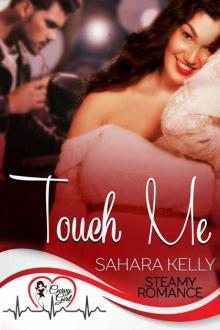 Touch Me: Curvy Girl Steamy Romance
Touch Me: Curvy Girl Steamy Romance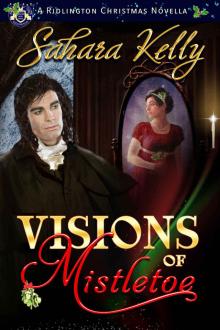 Visions of Mistletoe: A Ridlington Christmas Novella
Visions of Mistletoe: A Ridlington Christmas Novella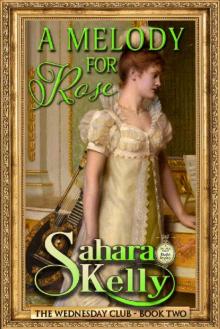 A Melody for Rose (The Wednesday Club Book 2)
A Melody for Rose (The Wednesday Club Book 2) Haunted Seductions
Haunted Seductions Music and Mistletoe: A Ridlington Christmas Novella
Music and Mistletoe: A Ridlington Christmas Novella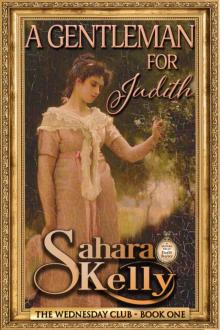 A Gentleman for Judith (The Wednesday Club Book 1)
A Gentleman for Judith (The Wednesday Club Book 1)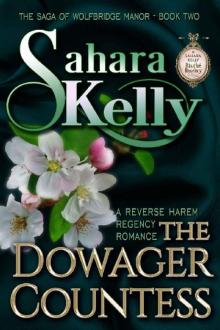 The Dowager Countess (The Saga of Wolfbridge Manor Book 2)
The Dowager Countess (The Saga of Wolfbridge Manor Book 2) The Rightful Lord (The Saga Of Wolfbridge Manor Book 3)
The Rightful Lord (The Saga Of Wolfbridge Manor Book 3)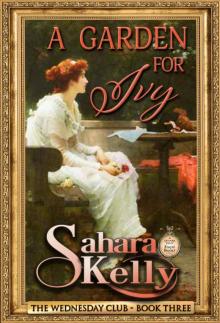 A Garden for Ivy (The Wednesday Club Book 3)
A Garden for Ivy (The Wednesday Club Book 3)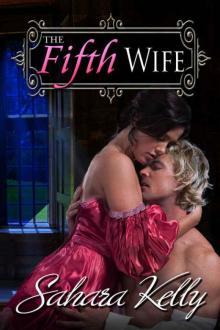 The Fifth Wife
The Fifth Wife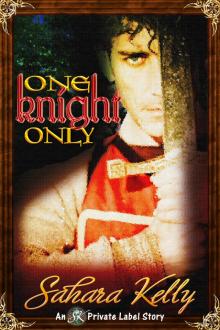 One Knight Only_SKelly
One Knight Only_SKelly Anasazi Fire
Anasazi Fire Word of a Lady: A Risqué Regency Romance (The Six Pearls of Baron Ridlington Book 3)
Word of a Lady: A Risqué Regency Romance (The Six Pearls of Baron Ridlington Book 3) Oh My Laird!: A Risqué Regency Romance
Oh My Laird!: A Risqué Regency Romance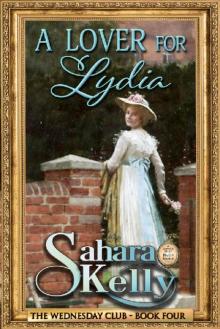 A Lover for Lydia (The Wednesday Club Book 4)
A Lover for Lydia (The Wednesday Club Book 4)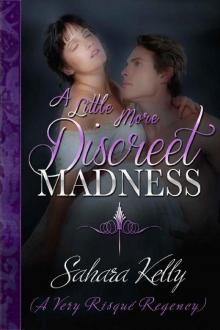 A Little More Discreet Madness: A Risqué Regency Romance
A Little More Discreet Madness: A Risqué Regency Romance My Wish - Time Guardians Book One
My Wish - Time Guardians Book One Heart in Hiding (The Six Pearls of Baron Ridlington Book 6)
Heart in Hiding (The Six Pearls of Baron Ridlington Book 6) Georgie and Her Dragon
Georgie and Her Dragon Compromising Charis
Compromising Charis Mistletoe Masquerade: A Ridlington Christmas Novella
Mistletoe Masquerade: A Ridlington Christmas Novella Destruction (Asylum for the Mechanically Insane Book 2)
Destruction (Asylum for the Mechanically Insane Book 2)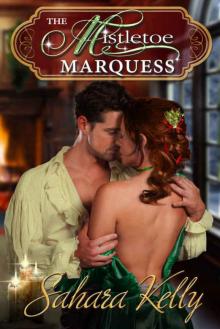 The Mistletoe Marquess: A Risqué Regency Romance
The Mistletoe Marquess: A Risqué Regency Romance Love in the Cards (Whole Lotta Love #1)
Love in the Cards (Whole Lotta Love #1)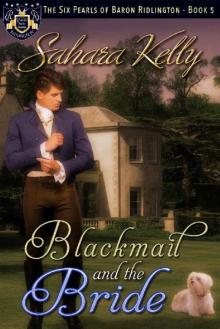 Blackmail and the Bride
Blackmail and the Bride Compulsion (Asylum for the Mechanically Insane Book 4)
Compulsion (Asylum for the Mechanically Insane Book 4)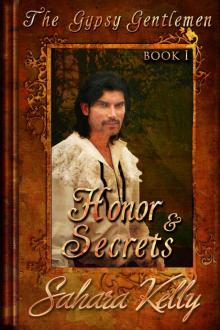 Honor and Secrets: A Risqué Regency Romance (The Gypsy Gentlemen Book 1)
Honor and Secrets: A Risqué Regency Romance (The Gypsy Gentlemen Book 1) A Kink In Her Tails
A Kink In Her Tails So Into You
So Into You The Mistress Wager
The Mistress Wager The Knights Elemental
The Knights Elemental Finding the Zero-G Spot
Finding the Zero-G Spot KnightsOfPleasure SKelly_Nook
KnightsOfPleasure SKelly_Nook Touch Me
Touch Me Consent
Consent Illusion (Asylum for the Mechanically Insane Book 1)
Illusion (Asylum for the Mechanically Insane Book 1) Endings and Beginnings: A Risqué Regency Romance (The Gypsy Gentlemen Book 3)
Endings and Beginnings: A Risqué Regency Romance (The Gypsy Gentlemen Book 3)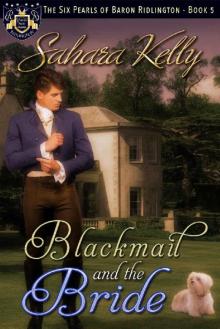 Blackmail and the Bride (The Six Pearls of Baron Ridlington Book 5)
Blackmail and the Bride (The Six Pearls of Baron Ridlington Book 5) Open All Night
Open All Night My Prize
My Prize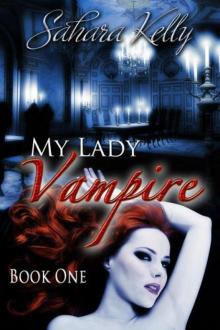 My Lady Vampire
My Lady Vampire For Research Purposes Only
For Research Purposes Only A Whole Lotta Love
A Whole Lotta Love Lady Adalyn (The Saga Of Wolfbridge Manor Book 1)
Lady Adalyn (The Saga Of Wolfbridge Manor Book 1) Love under the Lights (Whole Lotta Love #3)
Love under the Lights (Whole Lotta Love #3) Perversion (Asylum for the Mechanically Insane Book 3)
Perversion (Asylum for the Mechanically Insane Book 3) The Facilitator
The Facilitator Game Over
Game Over Destruction
Destruction Open House - Working Stiffs Book Two
Open House - Working Stiffs Book Two The Landlocked Baron (The Six Pearls of Baron Ridlington Book 1)
The Landlocked Baron (The Six Pearls of Baron Ridlington Book 1)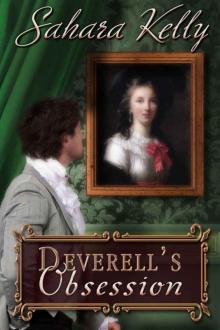 Deverell's Obsession: A Risqué Regency Romance
Deverell's Obsession: A Risqué Regency Romance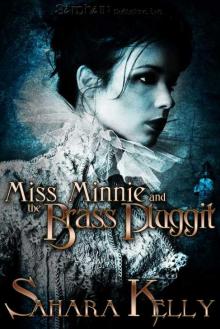 Miss Minnie and the Brass Pluggit
Miss Minnie and the Brass Pluggit Love on the Road (Whole Lotta Love)
Love on the Road (Whole Lotta Love) Control and Compassion: A Risqué Regency Romance (The Gypsy Gentlemen Book 2)
Control and Compassion: A Risqué Regency Romance (The Gypsy Gentlemen Book 2) The Mistress Wager: A Risqué Regency Romance (The Six Pearls of Baron Ridlington Book 4)
The Mistress Wager: A Risqué Regency Romance (The Six Pearls of Baron Ridlington Book 4) St. Simon's Sin: A Risqué Regency Romance (The Six Pearls of Baron Ridlington Book 2)
St. Simon's Sin: A Risqué Regency Romance (The Six Pearls of Baron Ridlington Book 2) Love on the Road (Whole Lotta Love #2)
Love on the Road (Whole Lotta Love #2)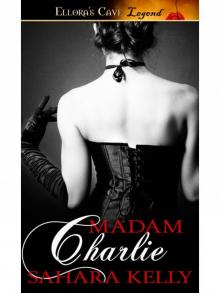 Madam Charlie
Madam Charlie Mistletoe Masquerade
Mistletoe Masquerade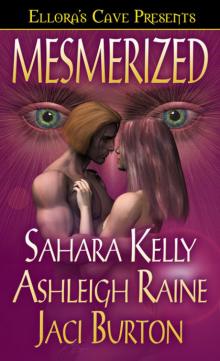 Mesmerized
Mesmerized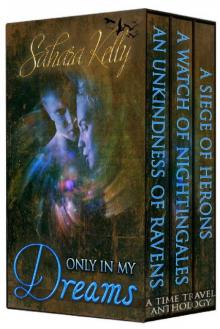 Only In My Dreams: A Time Travel Anthology
Only In My Dreams: A Time Travel Anthology Persephone's Wings
Persephone's Wings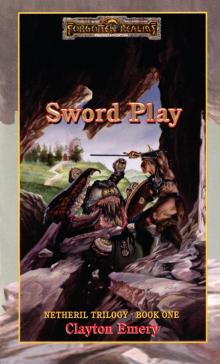 Sword Play
Sword Play The Sun Gods Woman
The Sun Gods Woman Love under the Lights (Whole Lotta Love)
Love under the Lights (Whole Lotta Love) Alana’s Magic Lamp
Alana’s Magic Lamp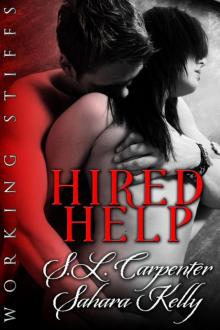 Hired Help - Working Stiffs Book One
Hired Help - Working Stiffs Book One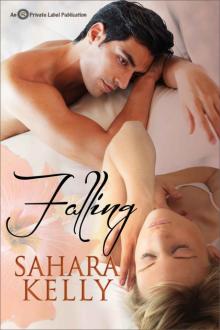 Falling
Falling